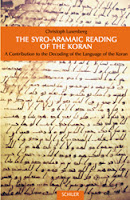This odd book is neither accessible nor academic, it does not appear to be addressed to the ordinary reader, nor to the scientific academic community. For an ordinary reader it’s overwhelming with extensive multilingual references, scripts and footnotes. For academics it’s overreaching in scope, lacking in focus, full of opinions and not presented in a manner that lends itself to peer review. I conclude it’s a hodgepodge of opinions presented as science and designed to impress and overwhelm ordinary readers. The central hypothesis of the book, the origins and development of the Arabic language is far from proven, agreed upon or established science.
Christoph Luxenberg, the name the author wrote under, presents an unfounded assumption that the early Quran manuscripts were written in Syrio Aramaic script. This central assumption drives much of the work of the book. Yet, this assumption can’t be supported by manuscripts, archaeological or historical evidence. A critical thesis presented in the book is that the Quran was never meant to be a “scripture”, rather it’s a liturgical poems for communal recitations. The Author supports this hypothesis with linguistic analysis of the Arabic word Quran and its relation to Syriac Aramaic words and how the sound “ya” in Aramaic was confused when writing Arabic with the sound “ah”. Few other similar minor arguments led the author to jump to this conclusion as an established fact. The author chose not to address numerous differences of narratives between the Quran on one side and what the Author references as Scripture, namely the Hebrew Bible and the New Testament. The Author simply chose to ignore all references in the Quran to the humanity of Jesus and the Quran’s insistence that Jesus is not divine and simply convinced himself that he, the Author, is single handedly dismantling the myth of the divinity and is correcting centuries old misunderstandings of it.
The Author puts forward more thoughtful analysis into various words used in the Quran and proposes Syrio Aramaic explanations for them such as الرقيم, قسورة، عتل، زنيم. The analysis of the points or dots on the letters and the possible connections to Aramaic in the early manuscripts is interesting but clearly needs to be subjected to historical critical peer review.
One of the author most far fetched or rather more outlandish theories comes in his interpretation of the Arabic word يسر and يسرنا where the author imposes a Syrio Aramaic reading on this straight forward Arabic meaning of to easing or make easier and insists that it means “translate”. The author then proceeds to suggest interpretations that the Quran itself states that it was translated.
The Author attributed parts of the Sura of Mary, specifically Quran 19:24 to the non canonical Gospel of Pseudo Matthew. Historians date Pseudo Matthew to around 800 AD/CE, it is therefore hard to argue that it was influential in the Mecca region nearly 160-190 years earlier. The author presented no evidence of a connection, yet proceeded to offer further interpretations to Sura 19 based on his unfounded and unsupported assumptions.
Moving beyond his stated specialty in Syrio Aramaic language, the Author proposed corrections for Arabic words that he didn’t attribute to Syrio Aramaic origins in a short chapter titled "Misread Arabic Expressions". While he offered interesting arguments based on his logic for his “corrections” of the placement of the dots for Sura 17:64, his approach indicated a weak methodology of research. The threshold or the substantiation for altering texts whose immediate intent may have not been clear appears to become the Author’s opinion.
The Author then proceeded to state in Chapter 15: “Now that it has become clear from the preceding analysis of individual samples of the language of the Koran that already in normal linguistic usage the Koran text has been in part so misread and misinterpreted by Arabic philologists and exegetes, it will no longer be surprising it meanwhile deeply anchored notions in the Islamic tradition, indeed religious contents, have been partially based on equally misunderstood Koran text.” This one unwieldy sentence betrays an approach of antagonism towards Islam disguised as scientific critical study of the language of the Quran.
On the topic of the so-called Virgins of Paradise or حور العين , the Author offered a fascinating discussion, in what appeared as a standalone paper or essay that was incorporated in the book. His approach to this particular part appeared more restrained, less opinionated and more engaging. He concluded that the concept of virgins of paradise was a misreading of the original Quranic texts.
The author concluded with detailed analysis of two short Suras 96 & 108 offering cogent arguments to possible Syrio Aramaic roots and reasoned interpretations. The author then, lacking substantiation, absurdly, offered the First Epistle of Peter as a root for Sura 108 and suggested erroneously that the text is rooted in an invitation to partake in a Christian Communion and to receive a Eucharist. The Author’s failed to offer any evidence of the First Peter being particularly important in the Syriac Christian history in terms of number of Syriac manuscripts or other indication of influence. The alleged connection to Eucharist was presented with no support whatsoever.
The coming decades will no doubt present the Muslim world with an increasing number of western historical critical studies of the text of the Quran and fundamentals of Islamic history. The work in this book sadly belongs to the category of orientalist islamophobia, and is not serious scientific work. This book is essentially an expression of the unfounded opinions of one man that, presented with the ornaments of a scientific study, but is certainly not that. This work does the field of historical critical study of Islam a great disservice.
Ayman S. Ashour






